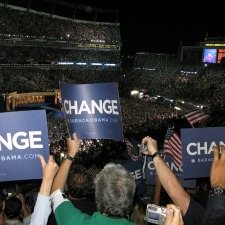BROOKE GLADSTONE: I’m Brooke Gladstone. Journalists may disparage them, pining for meaningful exchanges between candidates in debates but research suggests that conventions are more likely to get candidates elected. And that’s what’s really important here, right?
John Sides is a political science professor at George Washington University. He says one reason conventions move polls is that they happen earlier than debates, while a few people still haven’t made up their minds. Another factor is the control parties have over conventions.
JOHN SIDES: In a convention, being able to control the scenery and the staging and influence the news coverage for three days straight is just something that a debate can’t even begin to match. You know, debates, at best, provide a, just a little nudge for one of the candidates, and it’s rare that they’re the game changers that people oftentimes portray them to be.
BROOKE GLADSTONE: But we’ve seen studies that suggest that conventions don’t really change anybody’s minds. And, in fact, people who are not inclined to vote for the candidate won’t watch that candidate’s convention.
JOHN SIDES: Absolutely, it’s true that people who don’t really want to vote for a particular person or party probably won’t watch that convention and aren’t gonna change their minds, even if they did. I think it’s really the undecided voters who, if not watching the conventions themselves are at least reading and hearing enough about it to be influenced by what goes on there.
BROOKE GLADSTONE: Wait a minute, you’re saying you don’t have to watch the convention in order to be influenced by it?
JOHN SIDES: If you’re the average person who doesn’t follow politics like a political junkie does, then what you’re really just getting is kind of a – just a general sort of sense of how things are going. And I think that’s just provided by the general tone of news coverage.
The irony is despite this, you know, supposedly boring coronation of the preordained nominee, I think the coverage that the news media provides with a convention might be crucial for actually giving the candidate the bounce they receive in the polls.
BROOKE GLADSTONE: This bounce of which you speak, you say it lasts throughout the campaign. I was – under the impression it only lasted a few months or even a few days.
JOHN SIDES: I think the best way to think about the bounce is to – is to think about the, the state of the polls that go into the race as changing fundamental as a consequence of the convention and then leaving the race in a different state. So one candidate’s bounce might be, to some extent, temporary, the other candidate’s bounce might be, to some extent, temporary, but the net of that oftentimes is different than what was true going in.
I think the important thing about a convention is just that it generates a pretty one-sided positive flow of information in the news media, and so even if the public’s not actually watching the convention, what they’re seeing for several days is generally good news about the nominee and not much news about that person’s opponent.
BROOKE GLADSTONE: And what do you think of the coverage?
JOHN SIDES: My tendency personally is to watch as little of it as possible. I mean, I tend to watch the actual speeches themselves, but I don’t really tend to watch the analysis.
I think the people that tend to watch the cable news chatter are not really people whose views are in any flux. They’re just consuming more of what they want. Part of what a political campaign does, in general, is take people who have a natural tendency to support one side or the other and turn them from being sort of lukewarm to being rabid. And conventions are one event that plays that role.
BROOKE GLADSTONE: So if the point of these conventions is to turn lukewarm supporters into rabid supporters, then the – the real role of reporters would be to measure the degree of “foam” that’s been generated –
JOHN SIDES: [LAUGHS]
BROOKE GLADSTONE: - dripping off the jaws of the viewers.
JOHN SIDES: Yeah, I think that’s right. I mean, for me if I – if I were thinking about reporting on this, you know, you might try to do some innovative things in polling and try to get a sense of not just exactly who people want to vote for but how enthusiastic do they feel about the nominee. And when we’re just focused on the horse race number, you know, how many percent say Obama, how many percent say Romney, we’re gonna miss these subtlties.
BROOKE GLADSTONE: So coverage of the conventions, you think, should really come from the pollsters asking different kinds of questions, and the rest of the bloviaters and opinion-makers should just shut up.
JOHN SIDES: Votes are what count. And right now polls are the best measure we have for what those votes will be. My natural tendency is always to prefer hard data about what Americans, quote, endquote, “think” than it is to trust someone to tell me what they think Americans think.
BROOKE GLADSTONE: John, thank you very much.
JOHN SIDES: Thank you very much for having me.

